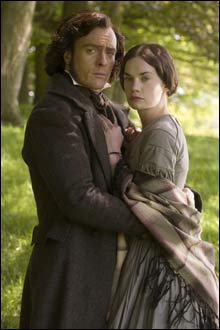
TRUE GOTH: The four-hour mini-series restores the novel’s emotional breadth. |
Every generation leaves its fingerprints on Jane Eyre. The new two-part, four-hour Masterpiece Theatre version of Charlotte Brontë’s 1847 novel (January 21 and 28 at 9 pm on WGBH) might even leave a few fingernail scratches. There’s more to this story than doomy love talk and long walks across England by a governess in love with her rich, unavailable employer. Director Susanna White (Bleak House) and writer Sandy Welch (BBC America’s North and South) perceive so much humor, darkness, and eroticism that even those who’ve studied the book or seen any of the dozen or so TV and film adaptations will wonder how — or whether — the forthright Jane Eyre will get out from underneath her moral dilemma . . . Wait! She’s underneath him? Rochester is on top of Jane Eyre? Did that really happen? Which chapter was that in? In October, seven million BBC viewers tuned in to find out: how hot is this going to get?Sahara-hot, if not Hell-hot. How thrilling and right to begin the tale of this castaway not with the same old recitation of the novel’s famous opening line (“There was no possibility of taking a walk that day”) but with 10-year-old Jane (Georgie Henley, Lucy in The Lion, the Witch and the Wardrobe) already on the march. Here’s a solitary figure, swathed in red silk, exploring desert dunes, her eye on the horizon. Our heroine, sitting “cross-legged like a Turk,” has dreamt herself into an illustrated book. Then Jane’s real life, with all its denials, intrudes — a moment that neatly explains why people gravitate to great fiction and drama. As Jane grows up, there’s no voiceover narration; instead, a subjective camera suggests her attitude toward the world. Ruth Wilson, who is just 24, makes a cool, watchful adult Jane — a mysterious beauty in the Emily Watson/Isabelle Huppert mode.
Many adaptations, like the 1944 Joan Fontaine/Orson Welles expressionist soap opera, shave away minor characters and side journeys — along with any sense of Jane’s questing, non-romantic life. This four-hour mini-series allows her years to live through her scrapes and recover. Little Jane, as always, faces the schoolmaster’s trick question: “What happens to disobedient, deceptive girls?” The answer — Hell — foretells the fiery fate of Bertha Rochester, who lives with demons in her mind. Here Jane reconciles herself with her Aunt Reed (Tara Fitzgerald), who had exiled her to Hell-on-earth Lowood.

And our hero? He looks old enough, as Brontë wrote, to be Jane’s father. But just barely. By the end of part one, Toby Stephens’s Rochester will have displaced Colin Firth’s Pride and Prejudice Darcy as the exemplar of screwed-up but fatally attractive leading men in period adaptations on TV. Go ahead, dismiss him as too handsome, too arch, too flirtatious right out of the gate: Stephens plays Rochester as though he’d been passed around an all-female congregation like a collection basket on Easter morning. To Jane’s straightforward assessment of her musical skills, he sneers, “That’s what they all say.” Bitter, yes. Sorry? No.
How does Wilson’s Jane stop herself from laughing at that? At their first meeting, when his dog, Pilot, gallops out of the mist like a supernatural monster with “pretercanine eyes,” she holds her ground. In this version, Pilot is a lurcher — a sort of hairy greyhound — and Wilson doesn’t flinch when she’s then nearly run over by his owner, a post-Regency wolf.